
The court denied the Theranos founder's request to remain free while she appeals the fraud and conspiracy convictions.
Elizabeth Holmes is due to begin serving more than 11 years in prison on April 27. In his order, Judge Edward Davila said Holmes does not pose a danger to the community, but he cast doubt on her appeal. Even if Homes wins the appeal, he said, it is unlikely to result in a reversal or an order for a new trial on all the charges she was found guilty of.

Holmes was sentenced to more than 11 years in prison last November for defrauding investors while running failed blood-testing startup Theranos, which was once valued at $9 billion. The former Silicon Valley star claimed the technology could diagnose disease with just a few drops of blood.
Theranos, a portmanteau of the words "Therapy" (Therapy) and "Diagnosis" (Diagnosis), promised that just through a drop of blood from a painless prick of the fingertip and through a machine, it would detect all possible diseases, distinguishable through blood.
All the media wrote about it, including Time, Forbes, New Yorker, etc. Holmes went from an unknown to a household name in Silicon Valley and managed to amass billions of dollars in wealth by defrauding investors. She was considered the queen of the male-dominated Silicon Valley.
But the investigation revealed that behind Theranos' success story, hidden laboratory procedures and questionable results. Prosecutors described him as a charlatan obsessed with fame and fortune.





